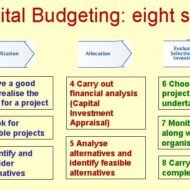Posted by Managementguru in Business Management, Decision Making, Marketing, Organisational behaviour, Principles of Management, Strategy
on Mar 23rd, 2014 | 0 comments

Smart Objectives for Success An objective describes something which has to be accomplished and defines what organizations, functions, departments, teams and individuals are expected to achieve. Objectives may be operational or developmental. When the contribution is oriented towards the accomplishment of corporate objectives, in the light of the organization’s mission, core values and strategic plans, it is termed as operational; personal or learning objectives that involve the improvement of knowledge, skills and performance of individuals is termed as developmental. Objectives must be SMART: S-scientific M-motivating A-achievable R-realistic T-time bound Objectives that are mostly confined to the near future may be termed-short term objectives, which are accomplished in the stipulated time duration. Say, for example, 1000 units of pet bottles have to be produced in a week’s time. If the firm is focused on the overall production plan for the forthcoming year, then it is termed as long term objective. In a production environment, a firm has to initially go for an aggregate plan, where the production capacity of the plant is determined to make the project feasible. The firm has to make doubly sure, whether it is resourceful in terms of physical, financial and human aspects. The work centers are allotted with jobs in a mock trial to check man versus machine co-ordination and compatibility. Pic Courtesy: Digital Information World Proper Planning: Objectives are achieved only when there is proper planning. The top management must take the pains to clearly explain the objectives to all the employees across different levels of organization to facilitate smooth functioning. When the employees understand what is expected of them, the performance gets oriented towards accomplishing the objectives; the employees get proper direction and focus. Delivering Happiness: A Path to Profits, Passion, and Purpose Think of this, what will happen to the sales volume, if the marketing manager does not properly educate his team about the targets to be achieved for that quarter? Definitely there will be a dip in the sales owing to the lethargic and irresponsible attitude of the manager. Ultimately, the organization stands to suffer a loss in terms of time and cost of recruiting a new person to head the marketing department. Right Person for the Right Job: Organizations have to be meticulous while choosing people for the post of managers. The chosen persons must be able to identify themselves with the organization and its objectives, so that they could be a source of inspiration for people down the line. Right people for the right job, at the right place and right time is the success mantra. Objectives have to be periodically revised in the light of changing economic, political and technological developments. How to Stop Worrying and Start Living If not the objectives might become obsolete and in due course you will get stranded amidst the roaring competition. The process of business management aims at managing people and other resources to make a modest profit. How to achieve success in an open market? By clearly setting objectives that serve as tools of motivation and persuasion, a firm can evolve and contribute strategic inputs that make the objectives realistic and...

Posted by Managementguru in Financial Management, Principles of Management
on Feb 20th, 2014 | 0 comments

Capital Budgeting- Long Term Resource Planning What is Capital Budgeting? Capital Budgeting refers to the process of planning expenditures that give rise to revenues or returns over a number of years. The process of investment analysis is essential to have a sustainable advantage in the competitive market and to stabilize the profits through resourceful strategic business units. The firm’s management must be on the alert to explore the opportunities present in the market. Obsolete product lines and changes in consumer tastes may present additional problems to a business enterprise affecting the profitability and growth. When a firm decides to venture into projects that demand huge investments, the management has to scrutinize the economic feasibility of such projects. The process of capital investment is also crucial because the projects are for the most part irreversible. Say, for example, if a business firm purchases a special type of machinery, and after installation, if the firm reverses its decision to sell the merchandise due to some technical reasons, it will have only a very small second hand value. Business firms based on the cash flow of the project and the capital recovery period do long-term investment. Why do firms opt for capital budgeting. The reasons may be: To replace worn out equipments that will affect the production efficiency To replace obsolete equipments to install new and more efficient ones To expand production facilities in lieu of increasing demand for the firm’s products and to capture new markets To divest the surplus funds from other business units and to rotate the funds, as idle funds will not generate any revenue To develop new products Research and development Investments made to comply with government regulations, such as projects undertaken to meet government’s health and safety regulations, pollution control and to satisfy other legal requirements. People Involved The proposals for new projects come from the internal environment, such as department heads, executives, employees and of course the management. Experts in product development, marketing research, industrial engineering examine the investment proposals and they may regularly meet with the heads of other divisions in brainstorming sessions to zero in on the proposals. This free course from Udemy is Ideal for people interested in entrepreneurship, fintech, big data, startups, finance, private equity, VCs, & investing. https://www.udemy.com/crowdfund-investing-101-the-basics-of-equity-crowdfunding/ Departments Involved While the firm’s top management makes the final say or decision to undertake or not a major investment project, the process is likely to involve most of the firm’s divisions. Each department has to present its view on the feasibility and viability of the project. The marketing department- on the demand for the new or modified products that the firm plans to sell The production, engineering, personnel and purchasing departments- on the estimation and cost of the investment projects The financing department on- how the required investments funds have to be raised. Thus, the process of expenditure analysis can truly be said to integrate the operation of all the major divisions of the...




